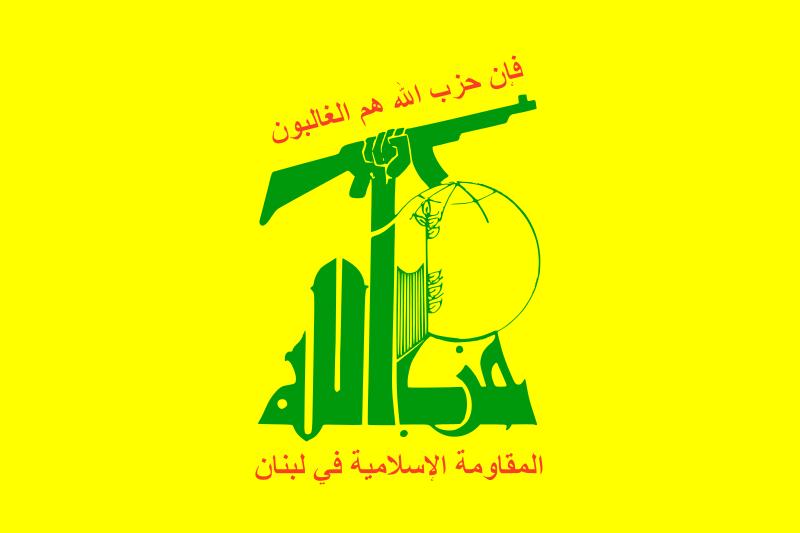|

|
Hezbollah is a Shi'a Islamist political and paramilitary organisation based in Lebanon.
Hezbollah
is now also a major provider of social services, which operate schools,
hospitals, and agricultural services for thousands of Lebanese Shiites, and
plays a significant force in Lebanese politics. It is regarded
as a resistance
movement throughout much of the Arab and Muslim world.
The US
government classifies Hezbullah as a terrorist organization for which it is
illegal to provide material support. Many governments, including Arab ones, have
condemned actions by Hezbollah while others have praised the party. Several western countries regard it in whole or in part as a terrorist
organization.
Hezbollah first emerged as a militia in response to the Israeli invasion of
Lebanon, also known as Operation Peace for Galilee, in
1982, set on resisting the Israeli occupation of Lebanon
during the Lebanese civil war. Its
leaders were inspired by Ayatollah Khomeini, and its forces were
trained and organized by a contingent of Iranian
Revolutionary Guards. Hezbollah's
1985 manifesto listed its three main goals as "putting an end to any colonialist
entity" in Lebanon, bringing the Phalangists to justice for "the crimes they [had]
perpetrated," and the establishment of an Islamic regime in Lebanon.
Hezbollah leaders have also made numerous statements calling for the destruction
of Israel, which they refer to as a "Zionist entity... built on lands wrested from
their owners."
Hezbollah, which started with only a small militia, has grown to an
organization with seats in the Lebanese government, a radio and a satellite television-station, and programs for social
development. Hezbollah maintains strong support among Lebanon's Shi'a population, and gained
a surge of support from Lebanon's broader population (Sunni, Christian, Druze) immediately following the 2006 Lebanon War, and is
able to mobilize demonstrations of hundreds of thousands.Hezbollah alongside with some other groups began the 2006–2008 Lebanese
political protests in opposition to the government of Prime Minister Fouad Siniora.
A later
dispute over Hezbollah preservation of its telecoms network led to clashes and Hezbollah-led opposition
fighters seized control of several West Beirut neighborhoods from Future Movement
militiamen loyal to Fouad Siniora. These areas were then handed over to the Lebanese
Army. On the
basis of the Doha
Agreement, Hezbollah was granted veto
power in Lebanon's parliament. In addition, a national unity government was
formed in which Hezbollah has one minister and controls eleven of thirty
seats.
Hezbollah receives its financial support from the governments of Iran and Syria, as well as donations from Lebanese people and
foreign Shi'as. It
has also gained significantly in military strength in the 2000s. Despite a June
2008 certification by the United Nations that Israel had withdrawn from
all Lebanese territory, in
August of that year, Lebanon's new Cabinet unanimously approved a draft policy
statement which secures Hezbollah's existence as an armed organization and
guarantees its right to "liberate or recover occupied lands."
On February 16, 1985, Sheik Ibrahim al-Amin issued Hezbollah's manifesto.
According to this manifesto (titled "An Open Letter: The Hizballah Program"),
the three objectives of the organization are:
The 1985 manifesto makes it clear that Hezbollah intends to use armed force
to achieve these goals and phrases its argument for this measure through the
language of defensive
jihad.
Since then Hizbullah has come up with a new manifesto in Dec 1, 2009 which
shifts its direction to better stay coherent with the current situation in their
community(Lebanese society).This new manifetso contains language that downplays
the islamic rhetoric and focuses more on integration into their
community.Furthermore, the new manifesto calls for the elimination of the
sectarian system in place right now in Lebanon and calls replacement of this
system by a secular modern system. However , the new manifesto states that the
US and Israel are still Hezbullah's prime enemies . Moreover ,it eliminates the
possibility of open discussion on its right to bear arms.
Governments disagree on Hezbollah’s status as a legitimate political entity, a
terrorist group, or both. Throughout most of the Arab and Muslim worlds, Hezbollah is
referred to as a resistance movement. Hezbollah's
violent acts are considered by some countries as terrorist attacks; other governments
regard Hezbollah as resistance and engaged in national defense."
|
 Copyright(C) 2007
- 2020. All rights reserved. Copyright(C) 2007
- 2020. All rights reserved.
|

![]() Copyright(C) 2007
- 2020. All rights reserved.
Copyright(C) 2007
- 2020. All rights reserved.